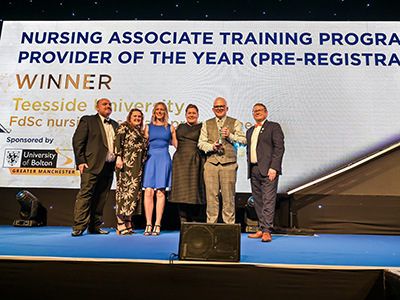Course overview
The higher apprenticeship recognises the workplace as a centre of knowledge building, and supports you by combining opportunities within the workplace and the University learning environment.
Through a range of modules, we support you in your continuing personal and professional development. Alongside your own workplace, you experience placements within a variety of settings covering the four fields of nursing, care across the age continuum and care in a variety of settings.
You study this full-time course over two years. The taught component of the course, delivered virtually through Microsoft Teams or at the University, includes an induction period followed by one day a week university time. In addition to the one day a week at the university there are four block weeks of teaching over the two years.
Please note, we can only respond to enquiries from employers, or individuals with agreement from their employer to undertake an apprenticeship.
Where you study
Centre for Professional and Executive Development (CPED): Teesside University’s Darlington Campus. Modules are also
virtually taught over the two years.
Supporting information for applicants
Course details
Course structure
Year 1 core modules
Anatomy, Physiology and Pathophysiology
You explore body systems, altered cognition, disability, illnesses and disease, ensuring parity of content. You engage in all four fields of nursing practice, utilising a whole person approach with emphasis on the complexity of the individual.
Introduction to Public Health for Nursing Associates
You explore decision-making and therapeutic interventions within nursing associate practice across a range of health and social care settings. You explore the relevant theories and influences linked to the wider determinants of health and wellbeing, developing your ability to facilitate an individual's health journey across the lifespan using a biopsychosocial approach.
Person-centered Care – the service user experience
You explore the philosophical basis and key concepts underpinning approaches to working with different people and service user groups. The biopsychosocial experience and impact of altered health and wellbeing, physical illness, cognition or treatment of the person and family is examined from the service user perspective.
Study Skills and Professionalism
You explore the knowledge to develop study skills, introduce reflective practice, and develop an understanding of professionalism and professional practice. You are introduced to the theoretical concepts underpinning professional practice including self-awareness, resilience, and self-management. You develop your understanding of the NMC Code, the expectations placed on them, and the principles of literature searching.
Year 2 core modules
An Introduction to Evidence Based Practice
The module underpins the apprentice's theory and practice and provides them with information regarding research into their area of work and rationale for why they carry out the care in certain ways.
Caring for People with Acute and Long-term Conditions and Co-morbidities
You develop your knowledge and understanding of acute and long-term conditions across the health and social care sector. You explore the impact of co-morbidities on patient experience and outcomes. A biopsychosocial approach ensures you look at the whole patient with consideration for assessment and safe management of all service users, across all health and social care settings.
Developing Public Health in Practice for Nursing Associates
You explore public health inequalities within health and social care practice. Appraisal of epidemiological and demographic data in addition to the national and local public health policies is undertaken to identify areas of need for service users, communities, and the wider population.
Enhancing Professional Practice for the Nursing Associate
You further develop your knowledge and skills for practice. You build on your clinical skills base and ability to select and use best available evidence to support your decision-making in practice according to your role. The module is work-based learning within your primary placement area and placements within other practice areas. Your placement journey provides learning opportunities in a variety of settings, including experience of child and adult patients, and service users with mental health conditions and learning disabilities.
You develop a comprehensive understanding of the unique perspectives, knowledge, and skills of the people you work with, and different members of the health and social care team. This knowledge is used to promote positive people-centred outcomes through collaborative and integrated working and further understanding of your scope of practice.
Modules offered may vary.
How you learn
The course is delivered through either a standard delivery pattern (typically one day a week in the University) or block delivery pattern (five block weeks in each year at the University). The remainder of the working week is spent in clinical practice and clinical placements.
The course combines and integrates both academic and work-based learning through close collaboration between employers and the University. The apprentice is encouraged to take responsibility for their own learning from the start of the course with support from the teaching team and within practice. They learn in a range of ways including lectures, seminars, practical skills sessions, group work, and an IT skills laboratory. They can also access our virtual learning environment, allowing them to engage with the learning and tutors in the workplace.
How you are assessed
Each module is assessed individually and we use a wide range of approaches including essays, exams, presentations and work-based competencies. The apprentice can access academic support through the course and they also have support in practice.
To be awarded the higher apprenticeship, the learner is required to successfully complete all assessment elements and undertake an end-point assessment.
Our Disability Services team provide an inclusive and empowering learning environment and have specialist staff to support disabled students access any additional tailored resources needed. If you have a specific learning difficulty, mental health condition, autism, sensory impairment, chronic health condition or any other disability please contact a Disability Services as early as possible.
Find out more about our disability services
Entry requirements
Entry requirements
To be accepted on to a degree apprenticeship course you must have support from your employer and meet the course entry requirements.
Apprentices will
> be currently, or on entry to the course, employed as an apprentice Trainee Nursing Associate
> hold Level 2 qualifications in English and maths before starting their apprenticeship. Find out more.
> demonstrate the appropriate values and attitudes for the programme through an interview with you as the employer and University
> work a minimum of 30 hours
> have a satisfactory enhanced DBS disclosure
You can gain considerable knowledge from work, volunteering and life. Under recognition of prior learning (RPL) you may be awarded credit for this which can be credited towards the course you want to study.
Find out more about RPL
Employability
Work placement
Trainee nursing associates experience placements within a variety of settings. The primary placement area is the place where they are employed. They undertake a minimum of 460 hours in placement external to their area of employment.
Career opportunities
Nursing associate roles and career progression for those who wish to access future pre-registration nursing courses.


 FdSc Nursing Associate, Higher Apprenticeship
FdSc Nursing Associate, Higher Apprenticeship Nursing Associate FDSC
Nursing Associate FDSC

